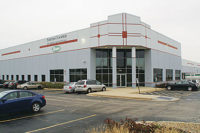The recent Flint, Mich. Water crisis has further brought to the forefront what already has been a long-simmering topic of discussion — water infrastructure in many parts of the United States continues to age and is in dire need of replacement.
And PHCP-PVF distributors and manufacturers of waterworks products are ready to help provide solutions to what most certainly will be an ongoing years-long fix.
“Infrastructure in old cities across the Northeast is aging and will need to be replaced in the near future,” says Chris DiPirro, general manager of the F.W. Webb Water Works Division. “Water-quality concerns across the region and the country are prompting municipalities to evaluate and monitor their potable water quality more closely and develop remedial action plans, with old lead-pipe replacement a top concern.”
F.W. Webb has positioned itself to be a solutions provider in the Northeast waterworks space. The company, celebrating its 150th year in business, recently acquired Malden, Mass.-based Water Works Supply Corp.
“The waterworks segment is a natural next step for us,” notes
Bob Mucciarone, COO of an F.W. Webb company that now has more than 80 locations in the Northeast. “We already sell every type of pipe in a building, home or facility. Waterworks complements our existing disciplines for a more complete offering. F.W. Webb wants to be a major part of the solution in the region as old and outdated municipal infrastructure is replaced. We are gearing up to be a big part of the process as the essential transformation of old piping systems to new ones unfolds.”
Across the country in Mesa, Ariz., Farnsworth Wholesale co-founder and Vice President Jack Stapley views the current municipal water infrastructure landscape as more of an opportunity than a concern. “When infrastructure fails, it creates an opportunity for us and our customers,” he says. “It’s the same situation as these infrastructures age. But the needs are being pit against city budgets. Take the Flint lead situation and the Toledo (Ohio) toxin problem. How do these fixes get paid for? Most municipal upgrades were put on hold during the recession and now we need to play catch-up. That can’t all of a sudden happen overnight. We are seeing a lot of infrastructure updating and replacing.”
Watts ACV Sales Manager Paul Denson feels the Flint situation opened eyes across the industry.
“Flint scared everybody,” he says. “Water quality is extremely important. As a country we need to realize that cross-contamination is a real concern. Water is the most precious natural gift we are given. It’s more valuable than gold.”
Keeping busy
With the housing market starting to rebound, distributors in the waterworks space are seeing plenty of infrastructure opportunities pop up. “We see the housing market coming back strong in most areas,” Farnsworth’s Stapley says. “This creates new developments and a lot of work through new water mains, new sewers and new sewer-treatment plants.”
Denson’s phone, he says, has been ringing at a steady pace of late with distributors reporting upticks in ongoing waterworks projects in their areas.
“Everybody is busy,” he says. “We’ve been busy. Every supply house I’ve talked to across the country reports that local waterworks projects are under way. Typically, when the municipal market is down, the commercial market is up and vice-versa. Now we’re seeing an uptick in both areas and development in rural areas. Across the South there is a lot of multifamily construction going on.”
Scott Wilson, president of Kansas City (Mo.) Winwater (a Winsupply company), calls the current climate “a decent time to be in business.” “Most of the business in Kansas City is wrapped around capital improvement programs,” he says. “Once a year the city has a fiscal-year capital improvement rollout. They will put out about $300 million worth of contracts for sanitary storm, treatment plants, pump stations and distribution mains. The city is spending money and a lot of the smaller towns are taking care of their infrastructure and plant-work needs.”
Wilson is seeing more and more area contractors sliding into the waterworks business. “Most contractors we deal with have become more diversified and are not putting all their eggs in one basket,” he says. “They aren’t doing only residential work. They are going into public works and a lot of it is sewer water rehab work. A big thing in Kansas City now is a lot of pipe bursting, water and sewer lines and a lot of slip-lining pipes. It’s more rehab than going out and doing 50-lot subdivisions every day. There are more risks when you do a rehab job, but the returns I assume are better for the contractor.”
One other recent trend is the interest PHCP-PVF buying groups are showing in the waterworks segment. For example, Geneva, Ill.-based Embassy Group established a waterworks arm several years ago. “It gives big benefits to the independent waterworks wholesalers,” Stapley says (Farnsworth is an Embassy member). “Not only do we combine our buying power together, but we assist members of the group with many other helpful and beneficial advantages such as sharing best practices.”
Educating the industry
In a more technical and specification-heavy marketplace, waterworks product distributors and manufacturers agree education is the greatest tool to remain a key player in the space.
“We leverage a lot of avenues to educate the supply chain,” Zurn Product Manager-Water Safety Rick Fields says. “For example, we have more than 40 videos on YouTube. They aren’t sales-targeted in nature, but are focused on helping customers understand how a valve functions, is properly applied, the startup process and how to maintain it. In waterworks, you have to bring a different expertise to the customer who relies on good technical and specification support skills.”
The same holds true on the distribution end when it comes to waterworks education both internally and externally. “Our customers expect knowledgeable and passionate sales responses from our salesforce when their needs require attention,” says Kevin King, Waterworks Division manager at Beaumont, Texas-based Coburn Supply. “As with all distributors, we continue to strive toward the goal of always adding depth to the bench by hiring new employees and heavily investing in training. We are investing in the future of our company and this industry.”
Watts’ Denson also sees an important opportunity to bring waterworks education to the forefront as municipality challenges are gaining more attention, and cities and states are playing a stronger role in regulating water.
“Some of the supply-house guys are pretty new and a lot of the water-plant operations are making a gatekeeper change,” he says. “That provides a great opportunity for the manufacturer to help them understand what they need to know to specifically address waterworks issues and provide clean, safe water. It’s all about providing that extra mile of service to clarify the requirements of the waterworks market and how to meet them.”
This article was originally titled “Ever-changing landscape” in the May 2016 print edition of Supply House Times.






